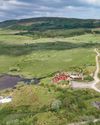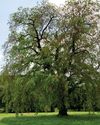
Never previously described in COUNTRY LIFE, this outstanding Scottish castle is architectural testimony to the exceptional wealth of its creator. John Goodall reports on its history and recent revival
ON Tuesday, April 5, 1830, The Times carried a report on a recent electoral scandal in the notorious rotten boroughs of Weymouth and Melcombe Regis, Dorset. Drawing on the evidence of a court case, it was revealed that a sitting MP, Col John Gordon of Cluny, 'a man of large landed estate and considerable wealth as well as of considerable ambition', had secretly supported the campaign of Edward Sugden later Lord Chancellor―to be returned to Parliament. He had done so in competition with his own brother-in-law and to the detriment of his young nephew's interest (of whom he was guardian).
All this for the hope of a peerage. The report mocked the colonel's unfulfilled ambition to become 'Thegn of Cluny' and quoted a letter in which the disappointed nobleman estimated the cost of his bid at the astonishing sum of $40,000.
The colonel-a predictably staunch opponent of Parliamentary reform-abandoned his political career and used his connections to torpedo the connected court case. His bid for a title, however, was only one element of his determined pursuit of self-aggrandizement.
The other was the ongoing remodeling of his Aberdeenshire seat, which had been purchased by his grandfather and namesake several decades earlier. John Gordon Snr is a figure of unknown parentage, first documented in 1740 as an Edinburgh merchant.
He was also seemingly a kinsman to Cosmo, 3rd Duke of Gordon, whom he served as a factor, and after whom he named his eldest son. A reputed miser, 'to whom every shilling he got within his fingers stuck' (as one anonymous contemporary asserted), he enriched himself in the cheap land market created by the '45 Jacobite Rising.
This story is from the {{IssueName}} edition of {{MagazineName}}.
Start your 7-day Magzter GOLD free trial to access thousands of curated premium stories, and 9,000+ magazines and newspapers.
Already a subscriber ? Sign In
This story is from the {{IssueName}} edition of {{MagazineName}}.
Start your 7-day Magzter GOLD free trial to access thousands of curated premium stories, and 9,000+ magazines and newspapers.
Already a subscriber? Sign In

A leap in the dark
The primal play of light and shadow, whether in Leonardo's ever-so-subtle sfumato or Caravaggio's dramatic contrasts, has shaped Western art, as Michael Hall reveals

Beauty and the blimp
Inflammable airships may be gone, but a new hybrid aircraft, capable of delivering eco-friendly aviation, is set to take to the skies with a bang, finds Charles Harris

Three wishes for food and farming
Royal hedge planting, the terrible toll on Ukrainian farming and a maiden speech

Seeing the wood for the trees
Scotland's much-evolved forestry industry has become a focus for clever investors

Let's fall in love
Birds do it, bees do it, even educated fleas do it. Laura Parker finds that, when it comes to creatures mating for life, persistence, patience and a little dad dancing are key to success

Back from the dead
THREE Wentworth elm saplings have been planted in the grounds of the Palace of Holyroodhouse, Edinburgh, and on the Highgrove estate in Gloucestershire-29 years after what was thought to be the lastknown Wentworth elm died.

A man among men
What makes a master? Beloved of the commercial art world, handled warily by art historians, the word has long been opaque. Michael Prodger investigates its many meanings-and discovers that being male confers an unfair advantage

Unearth one of life's luxuries
Black diamonds are a girl's best friend this Valentine's Day, with Périgord truffle-based skincare from TRUFFE

Adventure awaits
Spend an unforgettable family holiday on the Benmore Estate and experience some of Scotland's finest wildlife and sporting activities

Let the art rule the head
Despite being a world leader in everything from jewellery to fashion and music, the UK is failing to nurture creativity at school and in regional centres. Tristram Hunt, director of the V&A Museum, calls for an urgent review